As John Kennedy O’Connor takes to the airwaves in San Marino with their Eurovision Preview Shows, he’s been looking back at the history of the Preview Shows. In a time before Spotify, Napster, and even the world wide web, Eurovision fans had nothing. But then the EBU had an idea in the seventies…
So farewell then Eurovision’s national final season; at last it’s well and truly over. All 39 songs have been chosen, (some even re-chosen), finalised and selected and the Eurovisionistas now have just a week or two to go before the big show kicks off in Malmö.
Already, every entry has been dissected, reviewed, downloaded, shared, remixed, criticised, bet on, blogged about, tweeted, torn to shreds on Facebook; and added to thousands of iPods, iPads and at least four Windows Phones. Even with several weeks to go, some will already be tired of many of the 39 and most will have their firm favourites and indeed their firm dislikes. It’s a long, long road to modern Eurovision.
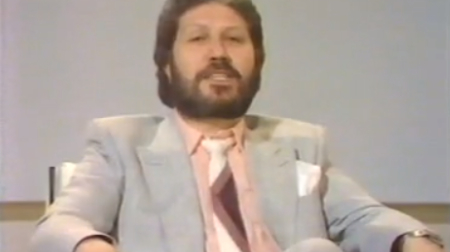
“There seems to be something radically wrong with my car,” thanks DLT!
It may be very, very hard for anyone under a certain age to imagine, but there was actually a time when none of this build up was there at all, or indeed was it even possible. For the first 15 years of Eurovision, the chances of even the most hard-core song contest fanatic hearing an entry other than their own nation before the big night was slim to nil. If you were lucky to live on continental Europe and near a border community, you had a fair shot at tuning in to a neighbouring country’s selection process or even picking up their song on the radio; there was also potential to buy it locally on record. None of these opportunities were guaranteed, but it was just about the limit of any pre-contest knowledge possible. For me, growing up in the island nation of Britain, without access to any international broadcasting, the chances of knowing anything about any other entry before they took to the Eurovision stage was zero. Totally.
I fondly remember my Irish born mother returning from a visit home to Dublin just before the 1970 contest took place. She’d seen and heard Ireland’s entry during her trip and was able to confidently predict that Dana was going to win the upcoming competition with ‘All Kinds Of Everything’. Turned out she was right. Although I wasn’t following the Contest particularly closely then and I was too young to see it myself, I knew enough about playground kudos to make the prediction my own and all Mary Hopkin’s legions of fans at my primary school were soon agog at my junior punditry.
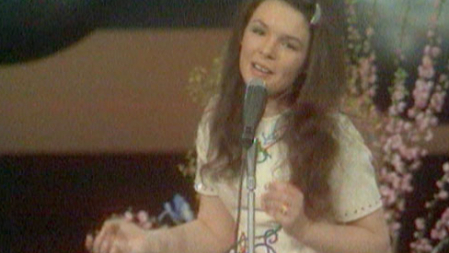
Dana Domestic
Hold On A Minute, Lads, The EBU Has A Great Idea.
Just one year later, things changed completely. The EBU introduced an innovative new rule to the Eurovision contest. All the competing nations had to produce a video clip of their entry for broadcast in each of the participating nations, specifically so that viewers could familiarize themselves with the contestants before the big night. It sounds quite quaint now, but this was a revolution and for a fan, an incredibly exciting one. For the first time ever, all viewers would be able to see and hear all of the songs before the biggest TV night of the year. I wasn’t swayed by what I saw; the UK was still best in my book and I abjectly failed to spot the potential of any of the other entries during the two programmes presented by Cliff Richard on consecutive Sunday afternoons. It didn’t matter, though; a new tradition had been born and suddenly the contest was more accessible.
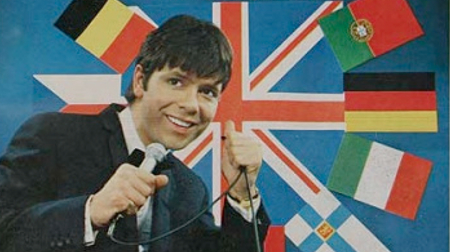
Before the World Wide Web, there was Harry Webb!
From the beginning of this new concept, some of the broadcasters sent along the clip of the performance from their domestic final, but others pushed the boat out and produced a film of the artist on location. Smaller broadcasters and indeed smaller nations lapped up the opportunity to show off their tourist delights to the international audience and some features of the show became an annual delight. Nordic artists were nearly always messing about in the snow and the Air Malta jet flying over Valletta was always a welcome sight. All that was missing from some of the videos were ‘Come here for your Holiday’ signs.
Even this exciting innovation to the contest was somewhat limited for a fan. There was no such thing as a video recorder and the technology for basic audio recording was extremely challenging; even if it had occurred to me to try. Despite hearing the songs at least twice, it still meant that once Eurovision was over for the year, there was almost no chance of hearing any of the songs again, other than the winner and the UK entry. If any of the other competitors were released on vinyl single, they were largely untraceable and certainly didn’t earn British radio airplay.
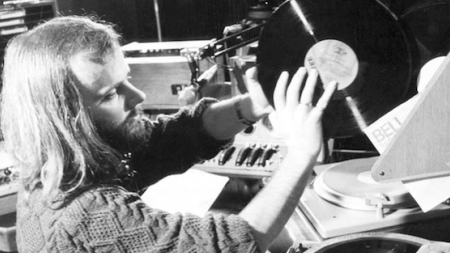
He would have played Winny Puuh…
For the next few years, the BBC made quite a fuss over the preview shows, televising them in prime time in 1972 on the two Monday evenings before the contest and in 1973 the show went out on early Saturday evenings. By 1974, they’d moved back to Sunday where they’d remain every year until 1994.
The Amateur Archivist
In 1976, I decided to record the audio track of the two preview shows, so that I’d have all of the songs to keep. This proved more fascinating than I would have imagined, since it not only meant I knew them back to front and inside out by the time of the live final in The Hague, it also made me acutely aware of how the song’s evolved before their final arrangement and performance. In many cases, the evolution was dramatic. By 1982, I’d started videotaping the previews and soon after the Eurovision final itself was committed to magnetic tape. It was now possible to relive either the video or the live contest versions of every entry as often as I wanted. Things had really moved on. Local record shops could even be relied upon to special order some of the contest entries made available by British record companies. There was a limited selection, but at least a few could be found.
The BBC were always seemingly supportive of the preview shows and although they may have been somewhat hidden on a Sunday afternoon, the national broadcaster never failed to promote the programmes, long after it transpired other nations had dropped the idea of televising them at all. The Dutch haven’t shown them since the very early days of the preview concept and many other countries had stopped showing them by the time the BBC followed suit in 1995. Their last preview broadcasts in 1994 had only included two minutes of each entry, with the rest of the show given over to guests, clips, comedy and quizzes. Still, for me and other fans, even that was better than the complete absence that followed.
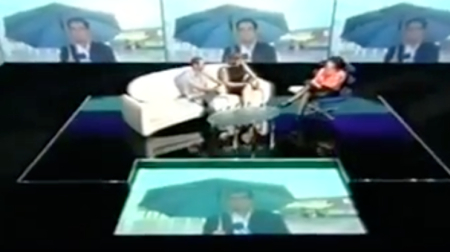
Is the rest of Europe aware of the cult of Lorraine Kelly?
BBC3 revived the shows in the early part of the 21st century, stripping the five programmes across Eurovision week and inviting celebrity guests to comment on clips of the songs. It was a short lived welcome back to the previews.
Along Comes The Internet
Modern Eurovision doesn’t need such a rule, even though you can still find it hidden in the paperwork. Fans have full access to every national final – indeed every national quarter and semi-final – via Internet links and online broadcasting, many facilitaed by the EBU themselves through the Eurovision.tv P2P streaming technology. Each country is still required to provide a ‘preview’ video of their entry, but the fans have seen and heard them all over and over by the time the videos are available for viewing.
The traditional broadcast of the previews isn’t entirely dead and this year, the EBU’s Jarmo Siim expects about half the national broadcasters will televise the previews in some format. The Scandinavian and Nordic nations have been grouping together to transmit the previews in recent years, sharing programming across their region. For many non-fans, this will still be their only chance to see the entries before the live stages in Malmö, should they wish.
And On Tonight’s Show…
I’ve just filmed the introductions for San Marino Radio & Television’s previews that will be broadcast nightly from April 30 and available online even sooner. It was a lovely opportunity to relive memories of watching Cliff Richard, David Vine, Terry Wogan, Michael Aspel, Ken Bruce and Gloria Hunniford (amongst others) do the same for the UK viewers in the past.
The Preview Show once was a genuinely magical opportunity to see and hear the competition without any fear of overexposure before the final itself and it’s great that many broadcasters still observe the tradition. The Eurovision fans of today with their fully loaded access don’t know they’re born. Really. In many ways, I don’t envy them.
There is such a thing as overkill. The previews were a gentler exposure, representative of a bygone broadcasting age. Familiarity can possibly breed contempt indeed and the free availability of all the songs across the whole continent and beyond has potentially made the Eurovision final less special. It’s a matter of choice. Knowing full access is available from the EBU in the many months that lead up to the final doesn’t mean it has to be accessed.
For those wanting their Eurovision music in abundance, the previews must seem anachronistic. For the more casual viewer, the previews still provide the best option for studying the form.








A nice read, thanks! I wonder if you were aware that the Nordic countries did co-operate in the early 60s via their own EBU, Nordvision in showing each others’ national finals, and some years just the entries from the neighbouring countries. So sort of a prequel to the proper preview shows. Guess the Nordics have been always at the forefront to push for new stuff for Eurovision proper as well, and I think the previews in 1971 were also one of the changes brought on by the Nordic boycott of 1970. They all declared the contest dead so all the novelties were brought in to make it fresh again.
I can’t remember even having seen any kind of previews on German TV, but admittedly I wasn’t even born when the concept was invented and haven’t followed the Song Contest closely for most of my life.
I was excited to find a show on Norwegian TV last year in which the videos to all the songs were played (albeit not necessarily in full length) and then discussed and awared points by the penalists. There were four shows altogether, each an hour long, and they were great fun for me to watch – luckily I speak Norwegian. So I’m very happy that this year’s shows (“Adresse Malmö”) will start tomorrow – I can’t wait, even though I already know most songs quite well. But it’s different to watch and listen closely than to just have them playing in the background, and it’s interesting to hear people discuss and rank them.
For me the idea of following the national final’s online is great, because you do have that chance via Twitter now to see what people think and to know what it’s going on. I do however keep to one rule for Eurovision itself and that is to not watch the semi final videos. If I knew what the performance was going to look like then that is the last unknown that wont exist anymore. I am too young to remember any of the preview shows in the UK, but to be honest I don’t see a reason why they shouldn’t come back in the UK if they work so well in the Nordics. There would be something great about actually being able to talk to friends who hate my interest in Eurovision, and actually say to them “watch the show and tell me what’s so bad about this?”
Thanks Juha. Much appreciated. WordPress had dropped a paragraph that’s now been restored if you fancy another read. I had highlighted the limits of living on an island without broadcast neighbours. It makes perfect sense that the Nordic nations teamed up as long ago as the 60’s. A lot of changes came about due to the 1970 boycott, although I’m glad that terribly tedious voting was short lived. JKO
An evocative article that made me yearn for those nostalgic days of the Sunday afternoon previews. We grew up through the best years and you summed up the anticipation and excitement beautifully, Gloria…I mean, JKO 🙂
Brilliant article John. I must say that Ken Bruce’s wit and wisdom was my favourite during the 80s and 90s. Glorias hair and shoulder pads also made for great viewing! Lots of well worn out VHS tapes still sit proudly on my shelves holding years of happy childhood memories.
Lovely article.
We überfans tend to forget that the majority of viewers (of the final, at least) still probably hear the songs for the first time on the night.
In some ways, the pre-contest overkill has spoiled the event, as well as making the result more predictable (less so this year, praise be!). But it’s very hard for any fan to resist the temptation to use the opportunity to preview ad infinitum . . .
I used to scan the pop charts of other countries during March and April, trying in vain to determine which might be their Eurovision entry.
But does anyone else remember how the European Pop Jury used to feature mostly the Eurovision entries of the participating countries at some point in the 70s? That was the best way to make a recording as well without using a mic next to the TV speakers and asking everyone to be quiet. We did not get a video recorder until 1984 I think